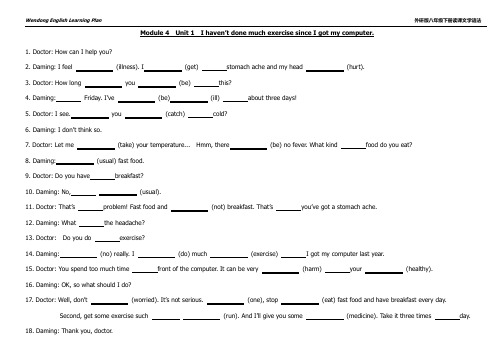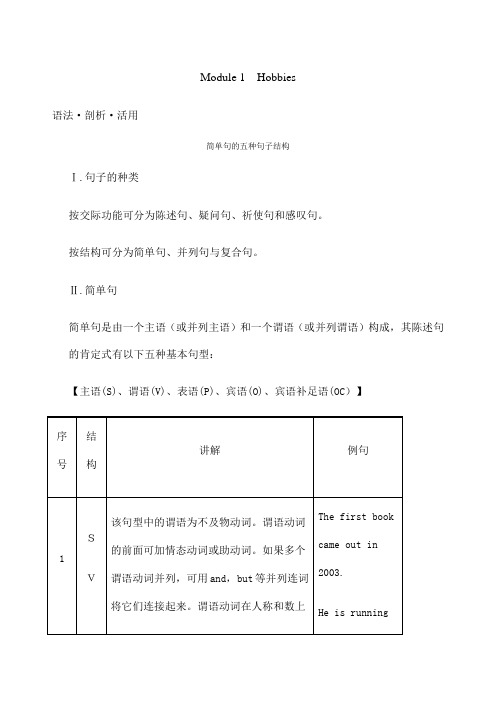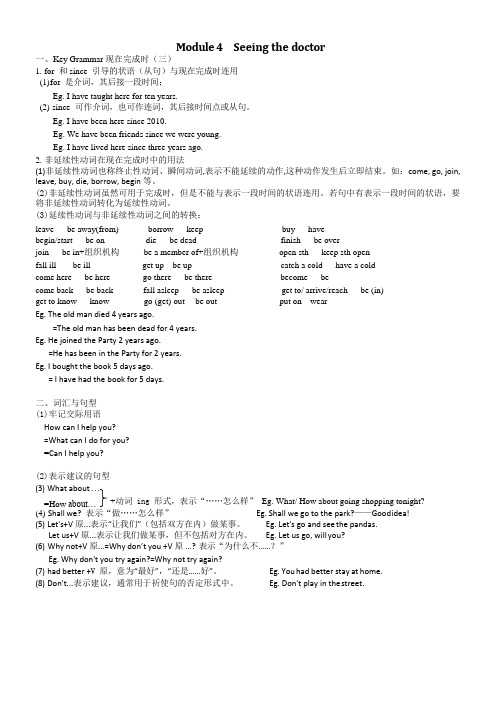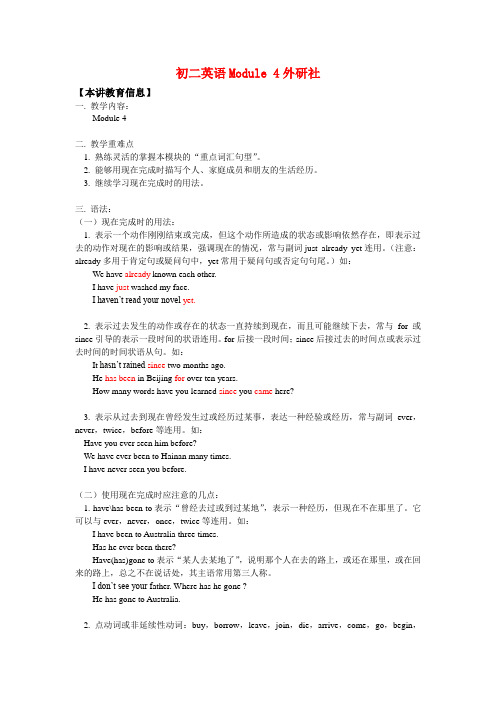外研版初二(下)英语第8讲:Module 4 语法篇(学生版)
- 格式:docx
- 大小:45.70 KB
- 文档页数:12

Module 4 Unit 1 I haven’t done much exercise since I got my computer.1. Doctor: How can I help you?(illness). I (get) stomach ache and my head (hurt).(be) this?4. Daming: (be) (ill) about three days!5. Doctor: I see. (catch) cold?6. Daming: I don’t think so.(take) your temperature... Hmm, there (be) no fever. What kind food do you eat?8. Daming: (usual) fast food.9. Doctor: Do you have breakfast?10. Daming: No, (usual).11. Doctor: That’s problem! Fast food and (not) breakfast. That’s you’ve got a stomach ache.12. Daming: What the headache?13. Doctor: Do you do exercise?14. Daming: (exercise) I got my computer last year.15. Doctor: You spend too much time front of the computer(harm) your (healthy).16. Daming: OK, so what should I do?17. (worried). It’s not serious.(eat) fast food and have breakfast every day.Second, get some exercise such (run). (medicine). Take it three times day.18. Daming: Thank you, doctor.Module 4 Unit 2 Healthy living(good)l the doctor (check) my heart and said I (need) more exercise.never (sport),(want) pet, so my parents (give) me a dog my birthday.(get) (exercise) taking him a walk every day.(have) him three months now and I feel (real) (health). ——Anna(decide) to start a (girl) football team and I (think):“What great idea!”I was first member the team.(play) football a year now and we all feel very fit.8. Our teacher is coach, and she also (take) part the (train) with us. She is excellent condition too. ——Wang Wei9. (go) to work the underground.(sleep) I was not (happily).(buy) a bike January. (become) part my life. Now I ride (work) every day.(day) exercise. I arrive work a smile my face.——Thomas(be) weak a long (want) (exercise) more.(suggest), “(not) we go a run before school?”(run) week ago.(run), and when I get school, I feel (awfully).(hurt) and I am hot all over(do) any exercise. What do you think? ——Richard。

Module 1Hobbies语法·剖析·活用简单句的五种句子结构Ⅰ.句子的种类按交际功能可分为陈述句、疑问句、祈使句和感叹句。
按结构可分为简单句、并列句与复合句。
Ⅱ.简单句简单句是由一个主语(或并列主语)和一个谓语(或并列谓语)构成,其陈述句的肯定式有以下五种基本句型:【主语(S)、谓语(V)、表语(P)、宾语(O)、宾语补足语(OC)】Ⅲ.there be 句型there be句型的结构是“there be +某人/某物+某时/某地”,含义是“在某时或某地有某人或某物”。
从以上讲解中我们可以初步掌握英语句子结构的一些特点:英语的句子以谓语为中心,前面是动作的执行者,后面是动作的承受者。
除了基本成分之外,状语也很重要。
状语可以位于句首,也可以置于谓语之后。
一般来说,置于句首的多是时间、条件和原因状语,置于谓语之后的是地点、方式、原因、目的、时间和伴随状语。
一般过去时和现在完成时的区别Ⅰ.时间上有差异一般过去时与现在没有关系,与表示过去的时间状语连用,如:ago,last year,just now,the other day等。
现在完成时与现在有关系,不能与表示过去的时间状语连用。
如:He has come back home.(说明现在他在家。
)He came back home last year.(只能说明他去年回来过,不能说明他现在在不在家,可能后来又出去了,但至今未归。
)Ⅱ.结果上有差异现在完成时和一般过去时都表示在过去完成的动作,现在完成时强调对“现在”的影响和结果,动作到现在刚完成或还在继续。
一般过去时强调动作发生在“过去”,和现在没有关系。
【活学活用】单项选择1)She ________the piano for six years,but she doesn’t play now.A. have playedB.playedC.has played答案:B 从后半句可以判断她已经不再弹钢琴了,说明前面的动作和现在已经没有关系,只是单纯地陈述过去的事情,所以用一般过去时。

1.d o a survey to find the most suitable exercise (锻炼方式)1.exercise泛指“锻炼”时,做不可数名词,如:take exercise 锻炼身体take more exercise多锻炼2.exercise表示“体操”或“练习(题)”时是可数名词,要用复数形式.如:do morning exercises(做早操),do eye exercises(做眼保健操) do English exercises(做英语练习)2.n ot do much exercise 没怎么锻炼3.D o many exercises 做很多练习4.H ow can I help you?=Can I help you?=What can I do for you?=Is there anything I can do for you?5.F eel ill/well/sad 系动词+表6.H ave (got) a stomach ache7.M y head hurts.= I have got a headache.8.H ow long have you been like this?9.时间状语助动主(系)谓语表10.I have been like this since Friday.11.I have been ill for about three days.12.It is Sunday today.13.Catch a cold=have a cold =get a cold14.Get a cough=have a cough15.Get a fever=have a fever=have a temperature16.Let me take your temperature.17.There is no fever.= There isn’t a fever.18.There are no flowers.=There are not any flowers.19.There is no milk.=There is not any milk.20.What kind of food do you eat?21.Eat fast food22.Have breakfast23.That’s the problem!24.That’s why...(结果):主系why+句子25.That’s because...(原因)26.What about=how about 名/代/动名词?27.介词28.What about Tom/him/swimming?29.Be doing 现分He is swimming.30.Do you do any exercise?31.I do some exercise.32.I don’t do any exercise.33.Spend too much time in front of the computer34.Spend time/$ (in) doing sth/on sth35.Sth be harmful to one’s health36.←→Sth be good to one’s healthAdj.37.Do harm to sth←→Do good to sth38.N.39.It can be very harmful to your health.40.Spending too much time... can be very harmful to your health.41.It can be very harmful to your health.42.=It can do much harm to your health.43.It’s not serious.=It is nothing much.没什么大不了的。

外研版英语八(下)Module 4 Seeing the doctor 模块语法详解现在完成时(3)1. 表示动作或状态从过去某时开始,一直延续至今,可能刚刚结束,也可能继续下去。
常与for 或since 引导的时间状语(从句)连用,用how long提问,谓语动词用延续性动词。
---- How long have you lived here? 你在这里住了多久了?---- I have lived here for about ten years. 我在这里住了大约10年了。
We have been very busy since the new term began. 新学期开始以来,我们一直很忙。
【拓展】since的四种用法:①since+过去一个时间点(如具体的年、月、日期、钟点、1980, last month, half past six)。
如:I have been here since 1989. 从1989起,我一直在这儿。
②since+一段时间+ ago。
如:I have been here since five months ago. 我在这儿,已经有五个月了。
③since+从句。
如:Great changes have taken place since you left. 你走后,变化可大了。
④It is / It has been+一段时间+since从句。
意为“自从……以来;已经……(时间)了”。
主句的谓语动词用一般现在时或现在完成时;从句的谓语动词用一般过去时,而且须是终止性动词。
如:It’s / has been three months since he moved to this city.他搬到这个城市已经三个月了。
⑤用于句型“一段时间+has passed since+时间状语从句”中,意为“自从……以来,……(时间)已经过去了”。
如:Three months has passed since he moved to this city. 他搬到这个城市已经三个月了。

Module 4 Seeing the doctor一、Key Grammar 现在完成时(三)1.for 和since 引导的状语(从句)与现在完成时连用(1)f or 是介词,其后接一段时间;Eg. I have taught here for ten years.(2)since 可作介词,也可作连词,其后接时间点或从句。
Eg. I have been here since 2010.Eg. We have been friends since we were young.Eg. I have lived here since three years ago.2.非延续性动词在现在完成时中的用法(1)非延续性动词也称终止性动词、瞬间动词,表示不能延续的动作,这种动作发生后立即结束。
如:come, go, join, leave, buy, die, borrow, begin 等。
(2)非延续性动词虽然可用于完成时,但是不能与表示一段时间的状语连用。
若句中有表示一段时间的状语,要将非延续性动词转化为延续性动词。
(3)延续性动词与非延续性动词之间的转换:leave --- be away(from) borrow --- keep buy --- havebegin/start --- be on die --- be dead finish --- be overjoin --- be in+组织机构be a member of+组织机构open sth --- keep sth openfall ill --- be ill get up---be up catch a cold --- have a coldcome here --- be here go there --- be there become --- become back --- be back fall asleep --- be asleep get to/ arrive/reach --- be (in)get to know --- know go (get) out ---be out put on---wearEg. The old man died 4 years ago.=The old man has been dead for 4 years.Eg. He joined the Party 2 years ago.=He has been in the Party for 2 years.Eg. I bought the book 5 days ago.= I have had the book for 5 days.二、词汇与句型(1)牢记交际用语How can I help you?=What can I do for you?=Can I help you?(2)表示建议的句型(3)What about …=How about…+动词 ing 形式,表示“……怎么样”Eg. What/ How about going shopping tonight?(4)Shall we? 表示“做……怎么样”Eg. Shall we go to the park?——Good i dea!(5)Let's+V 原...表示“让我们”(包括双方在内)做某事。

初二英语Module 4外研社【本讲教育信息】一. 教学内容:Module 4二. 教学重难点1. 熟练灵活的掌握本模块的“重点词汇句型”。
2. 能够用现在完成时描写个人、家庭成员和朋友的生活经历。
3. 继续学习现在完成时的用法。
三. 语法:(一)现在完成时的用法:1. 表示一个动作刚刚结束或完成,但这个动作所造成的状态或影响依然存在,即表示过去的动作对现在的影响或结果,强调现在的情况,常与副词just already yet连用。
(注意:already多用于肯定句或疑问句中,yet常用于疑问句或否定句句尾。
)如:We have already known each other.I have just washed my face.I haven’t read your novel yet.2. 表示过去发生的动作或存在的状态一直持续到现在,而且可能继续下去,常与for或since引导的表示一段时间的状语连用。
for后接一段时间;since后接过去的时间点或表示过去时间的时间状语从句。
如:It hasn’t rained since two months ago.He has been in Beijing for over ten years.How many words have you learned since you came here?3. 表示从过去到现在曾经发生过或经历过某事,表达一种经验或经历,常与副词ever,never,twice,before等连用。
如:Have you ever seen him before?We have ever been to Hainan many times.I have never seen you before.(二)使用现在完成时应注意的几点:1. have\has been to表示“曾经去过或到过某地”,表示一种经历,但现在不在那里了。
Module 4____________________________________________________________________________________________________________________________________________________________一般将来时:will+do一般将来时:will+do表示将来发生的动作或存在的状态,其结构是will+动词原形,常与表示将来的时间状语连用,如tomorrow,next...,in a few days,in+一段时间,in+将来的年份等。
如:Will you be back in two days?你将在两天之后回来吗?They will leave for Shanghai next week.他们下周将去上海。
当主语是I或we时,疑问句中一般使用shall,表示征求对方意见。
如?Where shall we meet tomorrow?明天我们在哪里见面?will表示的是一般将来时,本身没有人称和数的变化。
下面将will的句式总结如下:即:肯定句是:主语+will +动词原形否定句是:主语+will not (won’t)+动词原形一般疑问句是:Will +主语+动词原形?1.Mary__________to the party next weekend.A.goesB.will goC.wentD.has gone2.Steven’s parents him off at the airport tomorrow.A.will seeB.sawC.seeD.has seen3.I the film if I am free next Sunday.A.seesB.sawC.will seeD.has seen4.Everyone a small and light computer in the future.A.hadB.will haveC.hasD.is having5.I 30 years old in 2040.A.will beB.amC.wasD.were基础演练单项选择:1.There a heavy rain in Beijing tomorrow.A.isB.will beC.wasD.is going to have2. —When _______ the Browns leave here?—Tomorrow morning.A. WillB.doC. doesD. are3. In a few years’ time, there ________ thousands of trees in my hometown.A. will haveB. will beC. are haveD. have4. There will ______ a new library in our school.A. areB. haveC. beD. has5. —Will there be schools in the future?—No, there______.A. isn’tB. won’t beC. won’tD. will be not巩固提高完成句子:1.将来会有学校吗?__________there be schools in the__________?2.老师将不再用粉笔在黑板上写字。
模块语法聚焦四现在完成时(三)现在完成时也可表示过去已经开始的动作一直持续到现在,并有可能继续下去。
此时句中常需一个表示一段时间的状语,这个时间状语通常由since或for引导。
一、since 和for1.since作介词,后跟时间点,用来说明动作开始的时间。
Jim has lived in Tianjin since 2010.自2010年以来,吉姆就住在天津。
2.since也可作连词,引导时间状语从句。
从句中常用一般过去时,主句中常用现在完成时。
Tom hasn't called us since he went to school.自从上了学,汤姆还没有给我们打过电话。
3.for 作介词,后跟时间段,用来说明动作延续的时间长度。
My father has worked in Beijing for five years.我爸爸在北京工作五年了。
二、延续性动词和短暂性动词的转化短暂性动词不能与表示一段时间的状语连用,但我们可以用以下方式将其转换成不同形式进行使用。
1.转化为“be+形容词/副词等”。
die→be deadfinish/end/stop→be overleave→be awayarrive in (at)/reach/get to→be in/atopen/close→be open/be closedbegin→be onjoin→be in/be a member of2.转化为意思相同的延续性动词。
borrow→keep buy→haveopen sth.→keep sth. openfall ill→be illcatch a cold→have a coldget to know→knowput on→wearⅠ.单项选择( )1.2017·北京Lily is my classmate. We ________ each other since she came to our school.A.know B.knewC.have known D.will know( )2.—________ you ________ to Beijing?—No, I ________. I ________ there next month.A.Have; been; haven't; am goingB.Had; been; hadn't; am goingC.Have; gone; haven't; was goingD.Did; go; didn't; was going( )3.Mr Fan ________ this watch in 2006. He ________ it for over 10 years.A.bought; has hadB.bought; hasC.has bought; has hadD.has bought; had( )4.2017·哈尔滨Some boys in our class ________ the football club for a year. They are crazy about playing football now.A.joined B.have joinedC.have been in( )5.2017·黄石—Where is your uncle, Jane?—He is in Guangzhou. He ________ for a month.A.has left B.has goneC.left D.has been awayⅡ.句型转换1.I have kept the dictionary for two weeks.(用since短语改写句子)I have kept the dictionary________ ________ ________ ________.2.They borrowed the books two days ago. (改为同义句)They ________ ________ the books for two days.3.Mr Brown and his wife have been married for 20 years. (改为同义句)Mr Brown and his wife ________ ________ ________ ________ ________.4.I have waited for the bus for_20_minutes. (对画线部分提问)________ ________ have you waited for the bus?5.My uncle bought an English dictionary last week. (改为同义句)My uncle has ________ an English dictionary ________ last week.详解详析【语法精练】Ⅰ.1.C 考查动词的时态。
复习M4 New technology单词过关1.按v.2.按钮n.3.介绍n.4.录像n.5.复印v./n.6.录像机7.保存录像8.回放9.把..借给…1.leng2.memory3.recorderdy5.connect..to6.wait..for..填单词1.If you ______to record,press the red button.2.Chen Huan wants ____ ____for his programme,and he____me his CD recorder.3.If you want to__________the recorder,press the bule button.4.If you want to send your recording by email,_____therecorder______your computer.5._____________,sally.where’s your violin?重难点突破*1.memory n. Memorize v.记住、记熟*If your mobile phone does not have enough memory,save it on your computer.(内存)*Ex.If my_____saves me,your birthday should be on May 29.*A.memory B.memories C.remember D.memorize*Lend为及物动词,“借给”,把东西借出来*短语:lend sb sth或lend sth to sb*翻译:李明把自行车借给了小丽。
*___________________________________________ *ex.Would you like______me your bike to ride?*A.borrow B.to borrow C.lend D.to lend*解析:would like后加不定式*Instruction n.可数*Let’s looka at the instructions of this fan.*翻译:_____________________________________ *对话:*A:这台洗衣机怎么使用?*__________________________________________ *B :请看说明书。
Module 4语法篇____________________________________________________________________________________________________________________________________________________________________1.熟练掌握for,since在现在完成时中的应用2.掌握非延续性动词与延续性动词之间的转化3.掌握现在完成时与一般过去时的区别现在完成时(3)1. for,since在现在完成时中的应用在表示行为或状态从过去一直持续到现在时,通常要与表示一段时间的时间状语连用,这类状语通常由for 或者since引导。
for后接一段时间,而since后多接时间点。
He has been away for two years. 他已离开两年了。
He has been an English teacher since last time. 自去年以来他一直是英语教师。
2. 非延续性动词(又叫短暂性动词、瞬间动词)与延续性动词之间的转化英语中的动词从动词延续性上可以分为延续性和非延续性两种,在现在完成时中一定要注意动词这一特征,在和表示一段时间的时间状语连用时,应将非延续性动词转换为延续性动词。
I have had the book for two weeks.那本书我买了两个星期了。
My grandfather has been dead for two years.我的爷爷去世两年了。
1) 将短暂性动词转化为:be+形容词或副词The shop has opened for 6 hours.(错误)The shop has been open for 6 hours.(正确)2) 有些短暂性动词可以转化为意思相同的延续性动词如:那本书我借了一个月了。
I have borrowed that book for one month. (错误)I have kept that book for one month. (正确)3. 现在完成时与一般过去时的区别两种时态除结构、句式和相搭配的时间状语都不同之外,最重要的就是意义不同。
虽然都发生在过去,但现在完成时强调的是过去的动作对现在的影响,而一般过去时与现在没有任何关系,只是描述一个发生在过去的事实而已。
I have seen the film . 我看过这部电影。
(对现在的影响是我了解这部电影的内容)I saw the film last week. 我上星期看了这部电影。
(只说明上星期看了这部电影,不涉及现在的情况)单项选择1.(2019重庆中考B卷)---Miss lin has taught us English we came to this school?A. forB. sinceC. beforeD. when2.(2019浙江杭州中考)I scared of dogs ever since a dog hurt me when I was five years old.A. will beB. wasC. have beenD. would be3.(2019江苏南京第十八中学月考)Since 2019,Jingmen has become a new city . Everything.A. is changedB. was changedC. had changedD. has changed4.(2019云南昆明中考)--Long time no see!---Oh! It five years since we met last time.A. wasB. wereC. has beenD. have been5.(2019新疆乌鲁木齐中考)Mr. Brown his hometown since he the army .A. has left;joinedB. has been away from;has joinedC. has been away from;joinedD. left;joined6.(2019广东中考)Lei Feng for many years ,but his spirit is still encouraging us .A. diedB. has diedC. was deadD. has been dead基础演练一、选词填空(单句选词填空)1. We have learned five lessons (since/for) the beginning of this term.2. Mrs. Liao has been in hospital (since/for) last week.3. I have stayed at my aunt's (since/for) two weeks.4. Amy has had her favorite toy ( since/for) three years.5. I've had the bear (since/for) I was a baby.二、适当形式填空(单句适当形式)1. My uncle (teach) math since 1986.2. She (be) in hospital for two weeks.3. They ever (hear) of the singer.4. I (keep) the bike for one week.5. My parents (not come) back yet.巩固提高三、按要求转换句型1. The Greens have lived in Beijing since ten years ago. (对划线部分提问)the Greens in Beijing?2. I have had the bike for two years. (用since改为同义句)I have had the bike .3. I have had lunch at school. (对划线部分提问)you lunch?4. They got married three years ago. (改为同义句)They married for about three years.5. They came to this school in 2019. (改为同义句)They this school for two years.6. I have been ill for about three days. (对划线部分提问)you been ill?7. My headache started two days ago. (对划线部分提问)your headache ?四、翻译(根据中文提示完成句子)1. 我买这辆自行车五年了。
I the bike five years.2. 你像现在这样多长时间了?How long you like this?3. ---你曾经过去科学博物馆吗?---是的,我去过。
---you ever a science museum?--- Yes,.4. 我们已经从我们的卧室里清扫出许多东西。
We out a lot of things from our bedrooms.5. 詹姆斯自从2019年就在北京做外教。
James a foreign teacher in Beijing 2019.6. 她还没有关掉那台电脑。
She the computer yet.7. 从那时起,王先生就一直在这个工厂工作。
,Mr. Wang has worked in this factory.一、单项选择1. --- How long have you had the bike?A. Two years agoB. For two years agoC. Since two years agoD. Since two years2. --- Jack,I haven't seen your uncle for a long time.--- He Shanghai on business for two months.A. went toB. has gone toC. has been inD. has been to3. Rose came to Beijing in 2019. She here for eight years.A. was livingB. liveC. will liveD. has lived4. --- We've lived here 2019.--- So you've lived here about five years.A. since;forB. for;sinceC. for;forD. since;since5. --- Oh,Jack,your MP4 looks nice. Is it new?--- No. I it since two years ago.A. hadB. boughtC. have hadD. have bought6. She this book for nearly three weeks.A. has borrowedB. has lentC. has boughtD. has kept7. --- Have you studied English for a long time?--- Yes,I have studied it .A. five years beforeB. five years agoC. for five yearsD. since five years8. ---you Jeremy Shu-How Lin?--- Yes. The once-nameless young man became a basketball hero suddenly.A. Did;hearB. Do;listen toC. Have;heard ofD. Have;listened to9. --- Would you like to watch the three-D film Titanic with me ?--- Certainly. I don't mind seeing it again although I it twice.A. sawB. was seenC. have seenD. had seen10. --- When did they arrive?--- They two hours ago. They here for two hours.A. arrived;have arrivedB. got;have beenC. arrived;have beenD. reached;have reached二、完形填空All over the world people enjoy sports. Sports help people to keep 1 ,happy and to live2 . People play different games in winter and summer.3 is good for swimming. And in winter people often go skating. Some sports are very4 and people everywhere like them. For example,football is very popular. In China,most people,men,5 ,boys and girls,like to watch football games. They often talk about them.6 and jumping began long,long ago. But basketball and volleyball are rather 7 . People began to play them not long ago. And people are8 new sports or games all the time. Water skiing is one of 9 . People 10different countries may not be able to understand each other,but after a game they often become friends.1. A. health B. busy C. healthy D. lazy2. A. long B. longer C. happy D. happily3. A. Winter B. Summer C. Autumn D. Spring4. A. boring B. difficult C. expensive D. interesting5. A. woman B. women C. old D. young6. A. Run B. Runs C. Running D. To run7. A. new B. interesting C. popular D. old8. A. start B. play C. playing D. starting9. A. oldest B. newest C. the oldest D. the newest10. A. in B. of C. from D. at__________________________________________________________________________________________________________________________________________________________________阅读理解AWhen people go to the beach on vacation,many people like to eat seafood. But not everyone can enjoy it. Some people think seafood tastes great,but their bodies don't like it at all. When they eat it,their skin gets red and itchy(痒的). That's because they're allergic(过敏的) to seafood.When someone is allergic to a food,his body doesn't see that thing as a food. It sees it as an enemy and tries to fight it. It fights by making antibodies(抗体). Sometimes,when the body fights a food,it can make a person very sick.There are some ways to deal with food allergies. One is to stop eating the food that you're allergic to,but this may be hard. People are often allergic to very healthy foods,and it's hard to always avoid them.People can be allergic at different ages to different foods,like eggs,milk or peanuts(花生). If you think you might be allergic to a food,ask a doctor to have a look first.1. Some people cannot enjoy seafood,because .A. it doesn't taste goodB. it makes their skin hurtC. it gives them a headacheD. it makes them allergic2. What does the underlined word "enemy" mean in Chinese?A. 伙伴B. 支持者C. 敌人D. 病人3. According to paragraphs 3-4,which of the following is TRUE?A. A good way to deal with a food allergy is not to eat that food.B. Unhealthy foods often make people allergic.C. People with skin problems often get allergic.D. Food allergies often cause people to die.4. When a person is allergic to a food,.A. it can always make the person dieB. it can make the person very sickC. it can make the person very excitedD. it can make the person angry5. What can we learn from the last paragraph?A. Old people often have food allergies.B. Some everyday foods make people allergic.C. Most people are allergic to the same food.D. Doctors must be able to treat food allergies successfully.BIs talking on a cell phone bad for your health? It is difficult to know for sure. Some research suggests that heavy users of cell phones are at a greater risk of developing brain diseases. However,many other studies suggest there isn't any relationship between cancer and cell phone use.In fact,cell phones have only been popular since 1990s. And doctors point out that many cancers take at least 10 years to develop. They take cigarettes for example. Many years ago,people smoked a lot and didn't know the bad effect on health. Today,we know that cigarettes cause lung cancer,though it is still unknown how or why. Medical experts fear that the same thing will happen with cell phones.Are cell phones dangerous? It's really hard to answer this question. However,there is something true. Similar to microwave ovens,cell phones also give off electromagnetic radiation (电磁辐射). Over three billion people use cell phones for more than an hour a day. Cell phones get hot when they are used for a long time or being charged(充电). So holding a heat source near your brain during sleep is really bad for your health. Scientists suggest keeping electronic things,like computers and cell phones,out of bedrooms or at least six feet from your bed.6. The underlined words "heavy users" refer to .A. those people who use cell phones a lotB. those cell phone users who are strongC. those people who like expensive cell phonesD. those people who like cell phones with big screen7. When did the cell phones start to be popular?A. Since 1980s.B. Since 1985s.C. Since 1990s.D. Since 2019s.8. Medical experts fear that cell phones .A. get hot when being chargedB. have no relationship with cancersC. give off electromagnetic radiationD. will be proved to have bad effects on health9. According to scientists,we'd better not put electronic things in the .A. study roomB. kitchenC. bedroomD. living room10. What's the best title of the passage?A. Cell Phones and HealthB. Where to Put Cell PhonesC. What Will Happen to Cell PhonesD. Cell Phones and Microwave OvensCGerms(细菌) are everywhere. You can't see them,but they are on your desk,on your computer,and even in the air!Like people,germs move around the world. They fly with us on planes. When food,clothes,and other things travel around the world,germs travel,too. Some germs are safe,but some are dangerous. Germs cause illnesses like colds and the flu.Warmer Weather Brings GermsThe world's weather is changing. Cooler countries are getting warmer,so insects from hotcountries can move there. Some of these insects,like mosquitoes,carry dangerous germs. These germs cause headaches,fever,and can even kill people.Under Your SkinYour skin protects you from germs. It stops some germs,but not all. They can enter your body when you eat,or when you have a cut. Germs are on your hands,too. They enter your body when you touch your eyes,nose,or mouth.Fighting GermsYour immune system (免疫系统) protects you,too. When germs get inside your body,your immune system finds and kills them. Special cells(细胞) move around your body and fight germs. They help you stay healthy. Other cells make antibodies. Antibodies help your body find and stop germs.What can you do to fight germs? You should wash your hands with soap and water. Soap kills many germs,and water washes them away.11. According to the text,insects .A. kill germsB. carry germsC. protect germsD. love germs12. The underlined word "there" refers to .A. cooler countriesB. hot countriesC. everywhereD. the world13. Which of the following is right according to the text?A. All germs are dangerousB. There are more germs in cold placesC. Soap can kill all germsD. Germs can get into your body14. Which can be the best title for this text?A. Germs Are EverywhereB. Weather Is ChangingC. Skin Stops GermsD. Germs Are DevelopedD(浙江金华市2019年六校期中)Happiness is important for everyone. Most people want to be happy but few know how to find happiness. Money and success don’t bring lasting happiness. Happiness depends on ourselves. In other words,we make our own happiness.Some people believe that if they are wealthy,they will be able to do anything they want,which means happiness. On the other hand,some people believe that holding a high position in the government is happiness. In this way,you have not only money,but also many other things which can’t be bought by money. However,other people believe that having lots of money is not happiness,nor is holding a high position in the government. These people value their beliefs,or their intelligence,or their health. They think these can make them happy.2-1-c-n-j-yHere are a few ways to help you be happier.The first secret of happiness is to enjoy the simple things in life. Too often,we spend so much time thinking about the future,for example,getting into college or getting a good job,that we don’t enjoy the present. You should enjoy life’s simple pleasures,such as reading a good book,listening to your favorite music,or spending time with close friends. People who have close friends usually enjoy happier and healthier lives.The second secret of happiness is to be active. Many people go dancing or play sports. People canforget about their problems and only think about the activities.Finally,many people find happiness in helping others. According to studies,people feel good when they volunteer their time to do many meaningful things for other people. If you want to feel happier,do something nice for someone. You can help a friend with his or her studies,go shopping to get food for an old neighbor,or simply help around the house.Now maybe you know how to find happiness!15. The underlined word “wealthy” means “__________” in the passage.A. 快乐的B. 健康的C. 兴奋的D. 富有的16. Some people who hold a high position in the government think they can ______.A. get money and something they can’t buy with moneyB. do what they want to do at any timeC. enjoy health which makes them work hardD. take an active part in all kinds of activities every day17. The writer thinks the secret of happiness is that people ___________.A. think about getting a good jobB. think of presents they don’t likeC. often spend time with close friendsD. often spend time on entering the college18. The passage mainly tells us __________.A. how to find happinessB. how to save happinessC. to do something good for othersD. to value our beliefs or health。